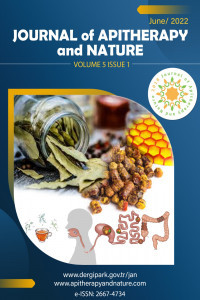New Insights into Tropical Propolis: Propolis from Pitcairn Island
New Insights into Tropical Propolis: Propolis from Pitcairn Island
___
- 1. Georgieva K, Trusheva B, Uzunova V, Stoyanova T, Valcheva V, Popova M, Tzoneva R, Bankova V (2018) New cycloartane triterpenes from bioactive extract of propolis from Pitcairn Island. Fitoterapia 128: 233–241.
- Yayın Aralığı: Yılda 2 Sayı
- Başlangıç: 2018
- Yayıncı: Oktay YILDIZ
New Antiproliferative Acyl Glycerols from New Zealand Propolis and Source Poplar Resin
Stephen BLOOR, Owen CATCHPOLE, Kevin MITCHELL, Rosemary WEBBY
ARC (Apiceutical Research Centre): Exploring a New Generation of Medicines from the Beehive
“Green” Synthesis of Gold and Silver Nanoparticles with Propolis Extract and Rosa damascena Waste
Anton M. SLAVOV, Daniela KARASHANOVA, Biliana GEORGIEVA, İvelina VASILEVA, Vassya BANKOVA, Rada DINKOVA, Nikoleta YANTCHEVA
Isolated Triterpenes from Stingless Bee Lisotrigona furva Propolis in Vietnam
Le Nguyen THANH, Vu Thi Kim OANH, Ha Thi THOA, Diep Thi Lan PHUONG, Nguyen Thi Phuong LIEN, Tran Huu GIAP, Nguyen Thi Minh HANG, Nguyen Van HUNG, Vassya BANKOVA
Chemical Profiling of Tropical Propolis: Challenges and New Data
Milana POPOVA, Boryana TRUSHEVA, Kristina GEORGIEVA, Vassya BANKOVA
Insights and Pitfalls in Propolis Research
Vassya BANKOVA, Milena POPOVA, Boryana TRUSHEVA
María Inmaculada GONZÁLEZ-MARTÍN, Eddy Valentín BETANCES-SALCEDO, Isabel REVILLA, Ana María VIVAR-QUINTANA
The Characterization and Bioactive Composition of Turkish Propolis
İlknur COSKUN, Gizem M. DUYMAZ, Tuğçe DASTAN, Ozge E. SONMEZER, , Sezer ACAR, Emir AKYILDIZ, Gamze DUZ, Ozlem YILMAZ, Sinem RADAY
Formulations Containing Propolis of Apis mellifera with Antibacterial and Antitumoral Activity
G.a. DOS SANTOS, A.a. LAGAREIRO NETTO, P.b. MENDES, V. NEGRÃO, M.C. MARCUCCI, S.N. DINIZ, M.J. CARNEIRO, A.C.H.F. SAWAYA
Some Apitherapeutic Properties of Chestnut Propolis
Sevgi KOLAYLI, Saliha EKSI, Zihni YAZICI, Oktay YILDIZ, Hüseyin SAHIN, Zehra CAN, Sengül KARAOGLU
